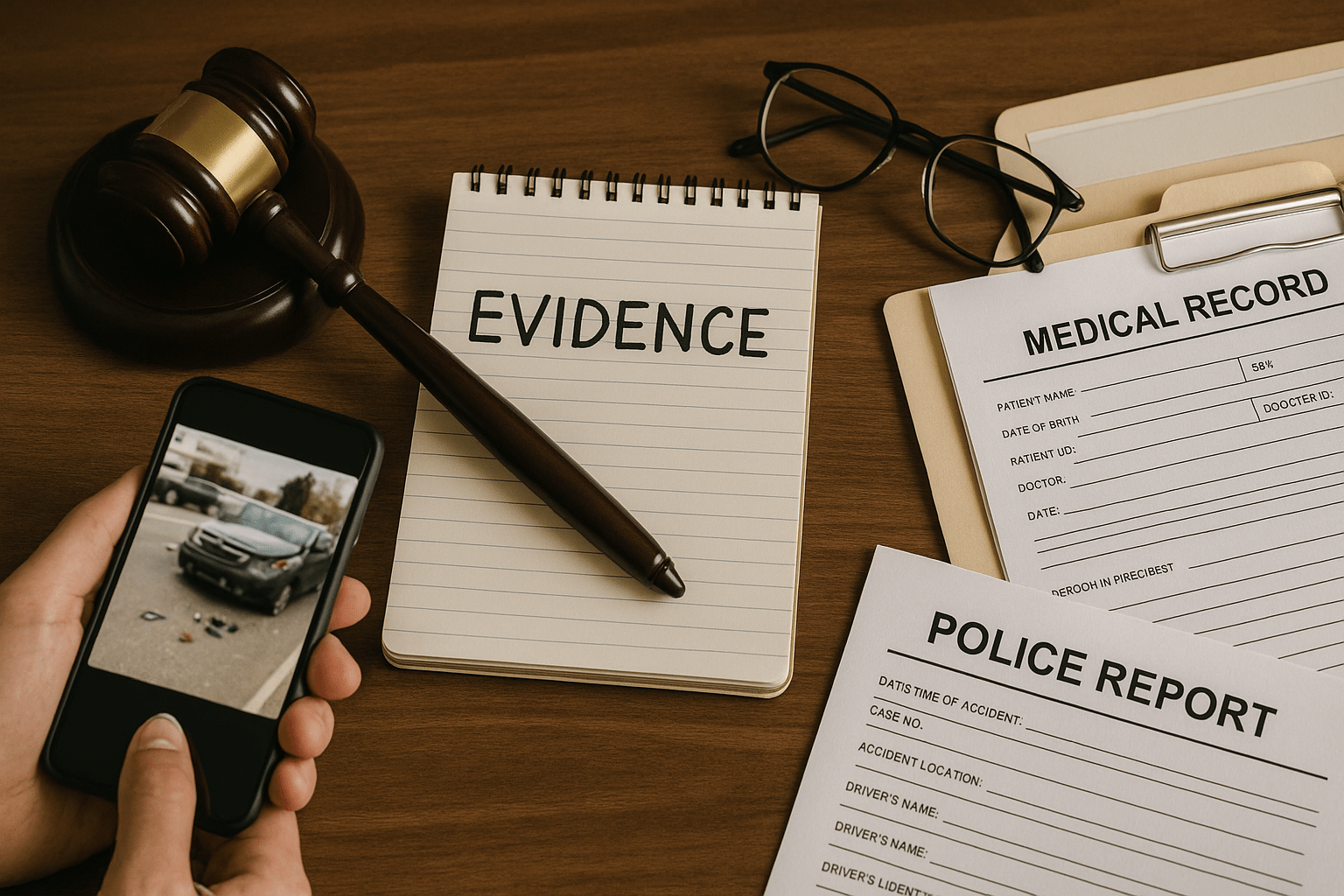5 Types of Evidence That Can Make or Break Your Injury Case
When you’re injured in a car accident, your case doesn’t begin and end with your injuries—it begins with your evidence. Whether you’re negotiating a settlement with an insurance company or preparing for court, the strength of your case comes down to one thing: proof. At KP Injury Law, we’ve seen firsthand how the right documentation can dramatically increase the value of a personal injury claim. Below, we break down the five most critical types of evidence you’ll need to support your case and protect your rights.
1. Photographic and Video Evidence
Visual evidence is often the most compelling in a personal injury case. Photos and videos taken at the scene of the accident can clearly show what happened, how it happened, and who was at fault. They can also reveal conditions that may have contributed to the crash—like road hazards, weather conditions, or vehicle damage.
What to Capture:
- Damage to all vehicles involved
- Skid marks or debris
- Traffic signs or signals
- Road conditions
- Visible injuries to you or others
- Witnesses or license plates
Dashcam footage, security camera clips, and smartphone videos can also provide valuable context. If you’re physically able after a crash, taking these images can give your attorney a huge advantage when negotiating with adjusters or defending against fault disputes.
2. Medical Records and Treatment Notes
Medical records are the backbone of your injury claim. They connect your injuries directly to the crash and help establish the severity and long-term impact on your life. Without detailed documentation of your treatment, it becomes easy for insurance companies to downplay your injuries or suggest they stemmed from something other than the crash.
Key Medical Documentation:
- Emergency room records
- Diagnostic imaging (X-rays, MRIs, CT scans)
- Physical therapy or rehab notes
- Follow-up care and prescriptions
- Doctor statements about limitations or disabilities
At KP Injury Law, we advise our clients to seek medical attention immediately after a crash—even if they feel “fine.” Many injuries, like whiplash or internal trauma, may not show symptoms until days later. Having prompt and continuous medical care creates a reliable paper trail.
3. Police Reports and Crash Documentation
When law enforcement responds to a crash, they generate an official report that becomes a key part of your case. Police reports typically contain unbiased observations, statements from all involved parties, witness information, and—importantly—the officer’s assessment of fault or citations issued.
What a Police Report Can Reveal:
- Time, date, and location of the crash
- Road and weather conditions
- Diagrams of the crash scene
- Preliminary fault assignment
- Witness statements
If the other driver was ticketed, charged with DUI, or admitted fault at the scene, this will be documented in the report and may strengthen your liability argument. In Tennessee, where comparative fault can reduce compensation, every detail counts.
4. Witness Statements and Testimony
Neutral third-party witnesses often make or break a case—especially when liability is disputed. Their observations can confirm your version of events or refute false claims by the other driver.
Best Practices for Witness Evidence:
- Get names and contact information at the scene
- Ask for written or recorded statements if possible
- Follow up with your attorney immediately
At KP Injury Law, we often contact witnesses soon after a crash to gather and preserve their statements. Over time, memories fade and people move—acting quickly helps us secure credible testimony to support your case.
5. Documentation of Damages and Impact
Your injury case isn’t just about medical bills—it’s about the full impact the crash has had on your life. This includes lost wages, pain and suffering, emotional distress, and other non-economic damages. To recover full compensation, you’ll need to document every way the crash disrupted your daily life.
Helpful Supporting Evidence:
- Pay stubs or employer letters showing missed work
- Journals tracking pain levels, doctor visits, and recovery progress
- Photographs of injuries during healing
- Statements from friends or family on how your life has changed
These may not sound like “evidence” in the traditional sense, but they help paint a picture of the real costs of a crash—and can significantly increase the value of your settlement.
Why Evidence Matters in Tennessee & Georgia Personal Injury Claims
Tennessee and Georgia operate under modified comparative fault, which means if you’re found to be 50% or more at fault, you can’t recover any damages. Even if you’re less than 50% at fault, your compensation will be reduced by your percentage of fault. This makes presenting clear, organized, and persuasive evidence absolutely critical.
What Happens If You Don’t Have Strong Evidence?
Without strong evidence:
- Insurance adjusters may deny or undervalue your claim
- The other party may blame you for the accident
- You may receive a lower settlement than you deserve
- Your case may not survive a legal challenge in court
That’s why our team at KP Injury Law moves fast to preserve evidence, document every detail, and build a rock-solid case from day one.
We Help Clients Build Their Case from the Ground Up
At KP Injury Law, we don’t just react to what insurance companies throw at us—we build cases proactively. Our attorneys and legal staff help clients:
- Request official police reports
- Obtain complete medical records
- Interview witnesses
- Coordinate with expert accident reconstructionists
- Document pain, suffering, and life disruptions
Every piece of evidence we collect adds leverage to your case and increases your chances of full financial recovery.
Final Thoughts: Evidence is Power
An injury claim isn’t about who tells the best story—it’s about who has the strongest proof. The sooner you begin gathering evidence, the stronger your case will be. Even a simple photo or receipt can be the difference between a dismissed claim and a six-figure settlement.
If you’ve been injured in a car accident anywhere in Tennessee, KP Injury Law is ready to help. Contact us for a free case evaluation and let us fight to protect your rights—armed with the evidence to back it up.

